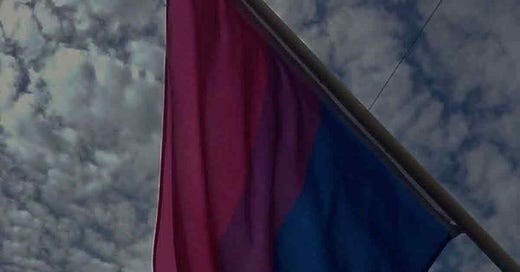I knew I was bisexual when I was 13 years old. Being so young and not quite understanding what you're feeling is already very overwhelming. Growing up in the bible belt added on extra pressure. I shoved down my sexuality until I was 25 years old. At this point I was already married and thought I was a fraud for even thinking I liked women. The world assumes they already know your whole story. People see the ring, the husband, and think “straight,” without ever asking or imagining otherwise. There’s love in the marriage, but also a quiet longing for your full identity to be seen and understood.
Sometimes you feel invisible in LGBTQ+ spaces, like you don’t quite belong, and other times you feel like you’re betraying part of yourself by not speaking it aloud. But being bi isn’t about what relationship you’re in — it’s about who you are. And even if others don’t always see the full picture, you know it’s there. It’s valid, it’s real, and it doesn’t go away just because you’ve committed to one person. When bisexual people marry the opposite gender, they are labeled as straight. When they marry someone of the same sex, they are labeled as gay.
The stigma around bisexuality often feels like being stuck in a space where no one fully believes you. You're told you're confused, going through a phase, seeking attention, or that you’ll “pick a side eventually.” In straight spaces, people may assume you’re secretly gay or just experimenting — in queer spaces, you might be seen as not “queer enough” or as someone who benefits from straight-passing privilege without carrying the weight of queerness. This constant invalidation can lead to self-doubt and silence, making it harder to express who you are. But bisexuality isn’t confusion — it’s clarity in the ability to love and be drawn to more than one gender. The stigma isn’t about the identity itself; it’s about the world’s discomfort with anything that doesn’t fit neatly into either/or.
I have identified as bisexual for almost 17 years now. I have gone through the ebbs and flows of confusion. Am I gay? Am I straight? Why do I feel like I don’t fit either of those things? I love my husband, but I also know my experiences with women were real as well. Today as I sit here at almost 30 years old, I am finally comfortable in my bisexuality. Being comfortable in your bisexuality means no longer shrinking parts of yourself to fit into other people’s expectations. It’s knowing that your identity is valid, whether you’re single, with a man, a woman, or anyone else — because it’s about who you are, not just who you’re with. It’s the quiet confidence of no longer needing to explain or justify your feelings, the peace that comes from embracing your full self without shame. You stop worrying about labels being misunderstood and start living in a way that feels true. It’s freedom, it’s pride, and it’s finally feeling at home in your own skin.




I'm fairly certain my mother was bisexual. I remember how hard it was for her to lose her best friend (probably lover) because she feared committing to a lesbian relationship. It's a difficult path. Thank you for your honesty.